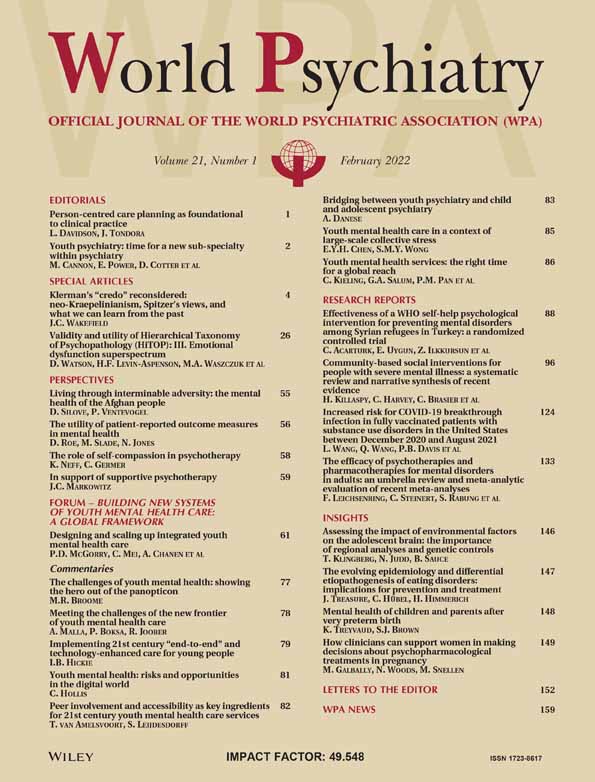Mental health for all: fostering healthy lifestyles.
IF 73.3
1区 医学
Q1 Medicine
引用次数: 1
Abstract
343 known, psychiatrists should be familiar with strategies known to improve coping, such as selfmanagement, mindfulness meditation, cognitive behavioural therapy, and supportive therapies. The burgeoning number of people needing psychiatric treatment because of the COVID19 pandemic has strained already in adequate mental health services. Access to mental health care has become more difficult, due to restrictive measures and the shortage of staff and other resources. Digital technologies have offered an immediate solution to continue delivering mental health treatment. Nevertheless, the lack of legal and ethical regulation, standardization and preparation has posed several challenges to the largescale application of telepsychiatry. Recognition of the opportunity to increase access to mental health care has led the WPA to develop global guidelines for telepsychiatry. Public health agencies’ commitment to increasing mental health awareness and selfhelp during the pandemic has also enhanced interest in other digital mental health interventions, such as those based on mobile apps, sensor data, social media, and virtual reality. The integration of these interventions into realworld clinical practice requires ongoing progress. Even as the pandemic fades, the psychological burdens of long COVID will create new needs for care. Furthermore, the easing of restrictions and the “return to the new normality” will require coping with new sourc es of stress. Governments, insurers and other funders should support increased re sourc es for mental health services, commen surate with the growth in demand for treat ment. Longerterm solutions, including a commitment to augmenting the mental health work force, are also needed. Our recommendations for action are the following:人人享有精神卫生:培养健康的生活方式。
本文章由计算机程序翻译,如有差异,请以英文原文为准。
求助全文
约1分钟内获得全文
求助全文
来源期刊

World Psychiatry
Nursing-Psychiatric Mental Health
CiteScore
64.10
自引率
7.40%
发文量
124
期刊介绍:
World Psychiatry is the official journal of the World Psychiatric Association. It aims to disseminate information on significant clinical, service, and research developments in the mental health field.
World Psychiatry is published three times per year and is sent free of charge to psychiatrists.The recipient psychiatrists' names and addresses are provided by WPA member societies and sections.The language used in the journal is designed to be understandable by the majority of mental health professionals worldwide.
 求助内容:
求助内容: 应助结果提醒方式:
应助结果提醒方式:


